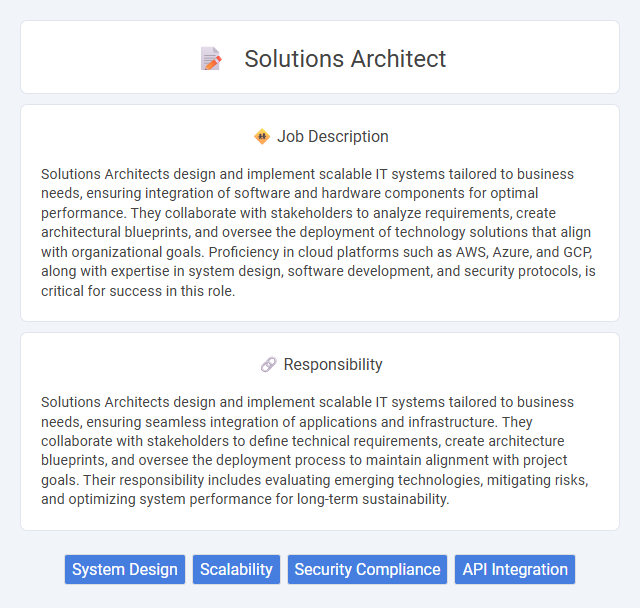
Solutions Architects design and implement scalable IT systems tailored to business needs, ensuring integration of software and hardware components for optimal performance. They collaborate with stakeholders to analyze requirements, create architectural blueprints, and oversee the deployment of technology solutions that align with organizational goals. Proficiency in cloud platforms such as AWS, Azure, and GCP, along with expertise in system design, software development, and security protocols, is critical for success in this role.
Individuals with strong problem-solving skills and a deep understanding of software development and IT infrastructure are likely suitable for a Solutions Architect role. Those who thrive under pressure, enjoy designing scalable systems, and possess excellent communication abilities probably find this position fulfilling. Conversely, people who prefer routine tasks or struggle with complex technical concepts may not be well-suited for this career path.
Qualification
A Solutions Architect must possess expertise in cloud platforms such as AWS, Azure, or Google Cloud, along with a strong foundation in software development and system design principles. Proficiency in programming languages like Python, Java, or JavaScript and experience with microservices architecture and DevOps practices are essential qualifications. Effective communication skills and the ability to translate complex technical requirements into scalable, secure, and cost-efficient solutions are critical for success in this role.
Responsibility
Solutions Architects design and implement scalable IT systems tailored to business needs, ensuring seamless integration of applications and infrastructure. They collaborate with stakeholders to define technical requirements, create architecture blueprints, and oversee the deployment process to maintain alignment with project goals. Their responsibility includes evaluating emerging technologies, mitigating risks, and optimizing system performance for long-term sustainability.
Benefit
Solutions Architects probably enhance organizational efficiency by designing scalable and cost-effective IT systems tailored to business needs. Companies might experience improved project success rates and reduced downtime due to their strategic planning and integration skills. Investing in a Solutions Architect could lead to better alignment between technology and business goals, potentially driving innovation and growth.
Challenge
The role of a Solutions Architect frequently presents complex challenges related to designing scalable and secure systems that meet diverse business requirements. Navigating the integration of emerging technologies while balancing cost and performance constraints likely demands advanced problem-solving skills. Managing stakeholder expectations and ensuring seamless collaboration across technical teams may also pose ongoing difficulties in this dynamic position.
Career Advancement
Solutions Architect roles offer significant career advancement opportunities through mastering cloud platforms, system integration, and strategic project leadership. Professionals gain expertise in designing scalable architectures and driving digital transformation initiatives, positioning themselves for senior leadership or specialized consulting positions. Continuous skill development in emerging technologies like AI, microservices, and DevOps further accelerates career growth and marketability.
Key Terms
System Design
Solutions Architects specializing in system design create scalable, efficient, and secure architectures tailored to business needs. They leverage cloud platforms like AWS, Azure, and Google Cloud to optimize system performance and integration. Their expertise includes defining system components, establishing communication protocols, and ensuring high availability and fault tolerance within complex infrastructures.
Scalability
Solutions Architects design and implement scalable systems that accommodate increasing workloads and user demands without compromising performance. They leverage cloud platforms like AWS, Azure, and Google Cloud to build elastic infrastructure, ensuring cost-efficiency and high availability during traffic spikes. Expertise in microservices architecture and containerization technologies such as Kubernetes enables seamless scaling and rapid deployment across diverse environments.
Security Compliance
A Solutions Architect specializing in Security Compliance designs and implements secure IT infrastructures that meet regulatory standards such as GDPR, HIPAA, and ISO 27001. They develop robust security frameworks, conduct risk assessments, and ensure data protection through encryption, access controls, and continuous monitoring. Collaboration with cross-functional teams ensures that architecture aligns with compliance mandates while supporting business objectives.
API Integration
Solutions Architects specializing in API integration design and implement scalable, secure interfaces that enable seamless communication between disparate software systems. They analyze business requirements to develop custom API strategies that enhance interoperability and data exchange, ensuring optimal performance and compliance with industry standards. Expertise in RESTful APIs, OAuth, and JSON/XML formats is essential for creating robust integration solutions that drive digital transformation.
 kuljobs.com
kuljobs.com